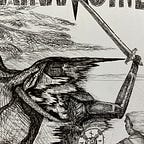Yesterday, I wrote here (https://laudeus-1.medium.com/environmentalists-are-killing-us-and-whatever-they-might-tell-you-thats-a-bad-thing-ebda6128a21d) about what separates the modern form of environmentalism (Land-ethicalism) from its ancient predecessor (Enviro-protectionism). I went on to prove why Land-ethicalism seeks to destroy civilization, in the name of becoming “citizens” instead of “conquerors” of nature. Land-ethicalism is, in other words, the suicide of civilization. After civilization and most humans had been destroyed, the remnants of humanity would, so the Land-ethicalists say, return to a peaceful, animal-like state, more like apes than humans.
At least, that’s what they say would happen (spoiler alert: it really wouldn’t).
Today, I’ll be continuing my previous thoughts by writing about the first Land-ethicalist and how his writings led to the suicidal actions of today. Later, I’ll connect his philosophy to other issues such as socialism and the denial of personal property. Today, though, let’s focus on the man and his connections with modern environmentalism.
His name was Jean-Jacques Rousseau, and he lived as a Parisian in the 18th century. The French Revolution closely followed his death, and I would argue that he was the one to have started it.
Among his writings was Discourse on the Sciences and Arts, which argued that the arts degrade society by elevating people’s minds (are you confused yet?).
He also wrote a book about the evils of his aristocratic government, and said that the solution to this was simply to have better aristocratic government.
He also wrote a book on parenting, which argued that the right way to raise a child is to isolate him from you and make sure that the child learns absolutely nothing, up until the time when you release him into the wider world at age twenty as a generally perfect human. This book was a great success, notwithstanding the fact that Rousseau was, in reality, the official worst parent ever (he had eight illegitimate children in two affairs, all of which he sold to the state orphanage simply because he didn’t want them).
For me, Rousseau’s biggest and most disastrous folly was the writing of his Discourse on Inequality, which states that civilization is responsible for the degradation of man, and that we would all be happy if no one had invented civilization.
In Rousseau’s idea of the world, the first humans were basically apes — they were naturally solitary, never tried to learn anything, and were able to defend themselves from all other animals with their bare hands. That last point is not only the most absurd (I’m sure Rousseau never saw, say, a tiger), but the keystone of Rousseau’s worldview. Anyone who considers this will quickly dismiss it as absurd, but strangely, no one ever talks about it.
If man’s ability to defend himself is Rousseau’s keystone, the idea that man is naturally solitary is Rousseau’s cornerstone, and can be just as easily dismissed: consider how much members of a family are tied together and rely upon each other. (Of course, Rousseau wouldn’t know because he never tried to have a family.)
(One more thing: Rousseau had no idea how humans could possibly have got from a solitary to a social state. He spends pages talking about the “insurmountable gap” between the solitary and social states, which man could not possibly have bridged. How does he solve this problem, you ask? Answer: he doesn’t. He glazes over it and moves on to his argument that civilization is unnatural and degrading.)
In reality, man is neither strong nor solitary, and this binds people together into societies.
Contrary to what Rousseau believed (and most people believe today), humans are naturally social: not only do we require society, we were created with the intention of being in society: According to Genesis 2:20–22, “But for Adam no suitable helper was found. So the Lord God caused the man to fall into a deep sleep; and while he was sleeping, he took one of the man’s ribs and then closed up the place with flesh. Then the Lord God made a woman from the rib he had taken out of the man, and he brought her to the man.” Adam could not exist in a solitary state, and neither can we.
Modern environmentalism (the idea that civilization is unnatural and degrading) is built upon Rousseau’s arguments; if these are disproved (as I have just done), the idea of environmentalism collapses.
In reality, society is natural, while environmentalism is not.
